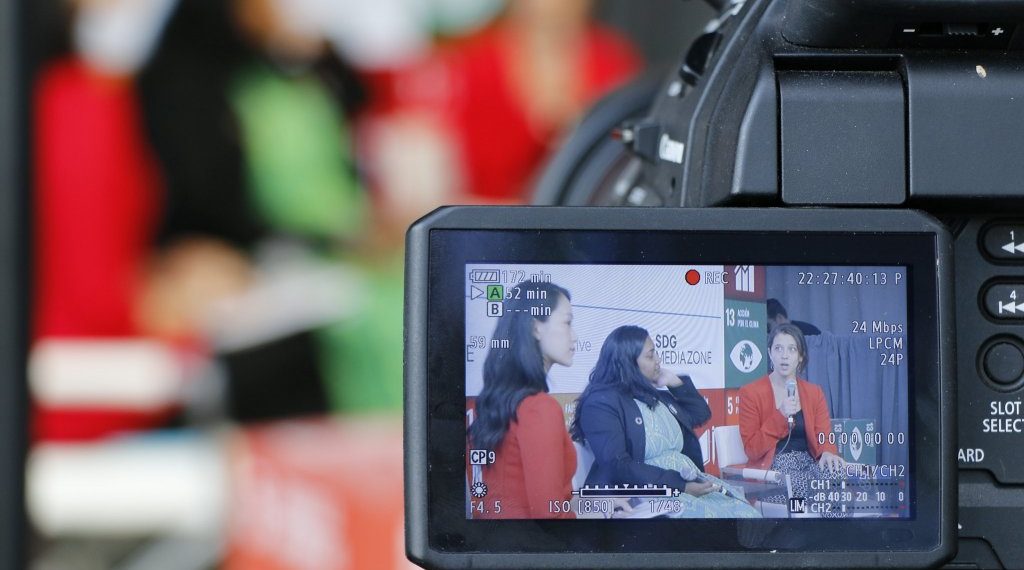Digital Technology and Impact on Women
![]() Phumzile Mlambo-Ngcuka, Executive Director of UN Women, and Mats Granryd, Director General of GSMA, in an interview with Daphne Burgida Ewing-Chow, Sustainability Contributor at Forbes, talked about the inequality between women and men in getting access to technology, especially in developing countries, and how technology can help support women’s independence. Granryds noted that GSMA, which works with mobile operators, signed UN Women’s empowerment principals in June and is dedicated to making technology more accessible to women. Globally, roughly 10% fewer women have mobile phones compared to men, and in developing countries the gap is worse.
Phumzile Mlambo-Ngcuka, Executive Director of UN Women, and Mats Granryd, Director General of GSMA, in an interview with Daphne Burgida Ewing-Chow, Sustainability Contributor at Forbes, talked about the inequality between women and men in getting access to technology, especially in developing countries, and how technology can help support women’s independence. Granryds noted that GSMA, which works with mobile operators, signed UN Women’s empowerment principals in June and is dedicated to making technology more accessible to women. Globally, roughly 10% fewer women have mobile phones compared to men, and in developing countries the gap is worse.
Solutions Journalism: Reporting on the SDGs
![]() Solutions journalism is a new-age approach to reporting that focuses on how individuals are responding to our world’s issues. Emily Kasriel, Head of Editorial Partnerships and Special Projects at BBC World Service Group, and Keith H. Hammonds, President at the Solutions Journalism Network, shared best practices in this field and debunked preconceived notions. In a discussion moderated by Nanette Braun, Chief of Campaigns at the UN Department of Global Communications, Kasriel and Hammonds emphasized that at the heart of this type of journalism are scalable solutions that give people information to make better decisions in their lives.
Solutions journalism is a new-age approach to reporting that focuses on how individuals are responding to our world’s issues. Emily Kasriel, Head of Editorial Partnerships and Special Projects at BBC World Service Group, and Keith H. Hammonds, President at the Solutions Journalism Network, shared best practices in this field and debunked preconceived notions. In a discussion moderated by Nanette Braun, Chief of Campaigns at the UN Department of Global Communications, Kasriel and Hammonds emphasized that at the heart of this type of journalism are scalable solutions that give people information to make better decisions in their lives.
New York City Climate Week
![]() Adam Lake, Head of Climate Week, says that after 11 years of holding the biggest climate week in the world, the engagement in the event is the highest ever. Climate Week is comprised of 350 different happenings – from comedy shows to high-level meetings. There is a feeling of responsibility among businesses this year, and high-level people are actually making changes, not just talking about them. When it comes to young people, concern for climate change has skyrocketed. Interviewed by Chen Yingqian of Phoenix TV, Lake said he hoped that in the future even more organizations and businesses got involved in the event, and reminded people that small choices can make big changes.
Adam Lake, Head of Climate Week, says that after 11 years of holding the biggest climate week in the world, the engagement in the event is the highest ever. Climate Week is comprised of 350 different happenings – from comedy shows to high-level meetings. There is a feeling of responsibility among businesses this year, and high-level people are actually making changes, not just talking about them. When it comes to young people, concern for climate change has skyrocketed. Interviewed by Chen Yingqian of Phoenix TV, Lake said he hoped that in the future even more organizations and businesses got involved in the event, and reminded people that small choices can make big changes.
Youth Voices on the Climate Action and Financing Nexus
![]() Genevieve Jiva, Coordinator of the Pacific Islands Climate Action Network, said that youth-led efforts are underfunded and undervalued. Jiva talked about the Greenpreneurs, a virtual accelerator programme that works towards the 17 Sustainable Development Goals. In a discussion moderated by Chen Yingqian of Phoenix TV, Dominique Souris, Co-founder and Executive Director of Youth Climate Lab, reminded the audience that this is the world we leave behind and that it was critical that youth are part of the conversation. Youth must be listened to in order to find new solutions.
Genevieve Jiva, Coordinator of the Pacific Islands Climate Action Network, said that youth-led efforts are underfunded and undervalued. Jiva talked about the Greenpreneurs, a virtual accelerator programme that works towards the 17 Sustainable Development Goals. In a discussion moderated by Chen Yingqian of Phoenix TV, Dominique Souris, Co-founder and Executive Director of Youth Climate Lab, reminded the audience that this is the world we leave behind and that it was critical that youth are part of the conversation. Youth must be listened to in order to find new solutions.
Global Action Plan For Health
![]() According to Peter Singer, Special Advisor at the World Health Organization, 3 to 5 billion people won’t have health coverage by 2030. A global action plan issued by 12 health organizations aims to address this crisis. Dr. Magda Robalo, Minister of Health of Guinea-Bissau, discussed how in her country and other African nations, major challenges include obtaining access to good-quality services, limitations of access, and limited resources. The discussion moderated by Daphne Burgida Ewing-Chow, Sustainability Contributor at Forbes, also included Toomas Palu, Advisor for Health and Population at the World Bank Group.
According to Peter Singer, Special Advisor at the World Health Organization, 3 to 5 billion people won’t have health coverage by 2030. A global action plan issued by 12 health organizations aims to address this crisis. Dr. Magda Robalo, Minister of Health of Guinea-Bissau, discussed how in her country and other African nations, major challenges include obtaining access to good-quality services, limitations of access, and limited resources. The discussion moderated by Daphne Burgida Ewing-Chow, Sustainability Contributor at Forbes, also included Toomas Palu, Advisor for Health and Population at the World Bank Group.
Moving the Money to Finance the SDGs
![]() How much do we need to finance the Sustainable Development Goals? According to some figures, the world needs 5-7 trillion a year to realize the SDGs by 2030. Steve Waygood, Chief Responsible Investment Officer at Aviva, and Neville Crawley, CEO of Kiva, shared the challenges, as well as the huge opportunities, for capital market players to move their money to finance the SDGs. “We are helping to finance the future that we wish to retire into,” noted financial advisor Steve Waygood in the conversation moderated by Tom Turnbull of Business Reporter.
How much do we need to finance the Sustainable Development Goals? According to some figures, the world needs 5-7 trillion a year to realize the SDGs by 2030. Steve Waygood, Chief Responsible Investment Officer at Aviva, and Neville Crawley, CEO of Kiva, shared the challenges, as well as the huge opportunities, for capital market players to move their money to finance the SDGs. “We are helping to finance the future that we wish to retire into,” noted financial advisor Steve Waygood in the conversation moderated by Tom Turnbull of Business Reporter.
Using Fintech to get the Money Where it’s Needed
![]() With interest rates low and investors looking for profitable opportunities, the question is how trillions in available funding can be allocated to finance the Sustainable Development Goals. “We must unlock the funding that is available,” said Maria Ramos, co-chair of the UN Secretary-General’s Task Force on Digital Financing of the SDGs. According to Ramos, digitalization can provide a huge opportunity to finance the SDGs. In a conversation moderated by SABC’s Sherwin Bryce-Pease, Natalie Payida Jabangwe, CEO of the Zimbabwe-based fintech EcoCash, talked about the opportunities of using data to give consumers more co-determination about where their savings go. Whether it’s education or green energy, fintech can help ensure that “some of the investments go to a better future,” Jabangwe said.
With interest rates low and investors looking for profitable opportunities, the question is how trillions in available funding can be allocated to finance the Sustainable Development Goals. “We must unlock the funding that is available,” said Maria Ramos, co-chair of the UN Secretary-General’s Task Force on Digital Financing of the SDGs. According to Ramos, digitalization can provide a huge opportunity to finance the SDGs. In a conversation moderated by SABC’s Sherwin Bryce-Pease, Natalie Payida Jabangwe, CEO of the Zimbabwe-based fintech EcoCash, talked about the opportunities of using data to give consumers more co-determination about where their savings go. Whether it’s education or green energy, fintech can help ensure that “some of the investments go to a better future,” Jabangwe said.
Championing an End Violence Against Women and Girls
![]() Cecilia Suárez, actor and Spotlight Initiative Champion, and Jaha Dukureh, activist and UN Women Goodwill Ambassador, discussed their work for the Spotlight Initiative, championing an end to violence against women and girls. Key takeaways included the involvement of men in gender equality advocacy and creating platforms for discussions that are inclusive and culturally sensitive. As Dukureh stated, “We can’t import solutions into a community and expect change”. The session was moderated by Folly Bah Thibault of Al Jazeera.
Cecilia Suárez, actor and Spotlight Initiative Champion, and Jaha Dukureh, activist and UN Women Goodwill Ambassador, discussed their work for the Spotlight Initiative, championing an end to violence against women and girls. Key takeaways included the involvement of men in gender equality advocacy and creating platforms for discussions that are inclusive and culturally sensitive. As Dukureh stated, “We can’t import solutions into a community and expect change”. The session was moderated by Folly Bah Thibault of Al Jazeera.











